-
Welcome back Guest! Did you know you can mentor other members here at H-M? If not, please check out our Relaunch of Hobby Machinist Mentoring Program!
You are using an out of date browser. It may not display this or other websites correctly.
You should upgrade or use an alternative browser.
You should upgrade or use an alternative browser.
Hey All.......new Here....1st Lathe Coming...
- Thread starter Paxx
- Start date
- Joined
- Aug 29, 2013
- Messages
- 1,050
Reminds me of an old joke...
Texas rancher to Vermont farmer: "How big is your place up there?"
Vermont: "Not very."
Texas: "When I get in my pickup truck it takes me all afternoon to drive around my ranch."
Vermont: "Yep. Had a truck like that once myself."
Texas rancher to Vermont farmer: "How big is your place up there?"
Vermont: "Not very."
Texas: "When I get in my pickup truck it takes me all afternoon to drive around my ranch."
Vermont: "Yep. Had a truck like that once myself."
- Joined
- Apr 10, 2016
- Messages
- 18
Wow......... I had forgot all about this intro thread I started so long ago. So for those of you who may be interested..............I did get my lathe home, but had life get in the way for quite a while after I got it unloaded at the overhead door of my shop. And there it sat until I finally got into the 'make things for Christmas mode" and thinking about gifts to make for my 7 sons/sons-in-laws as well as my 14 yr old grandson. So without moving it from where it sat I got busy getting to know my new machine. Here are a few pics of it now sitting where she will till I decide to shuffle things around.
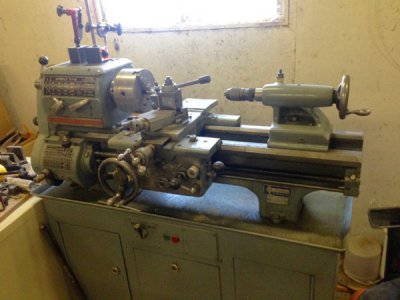
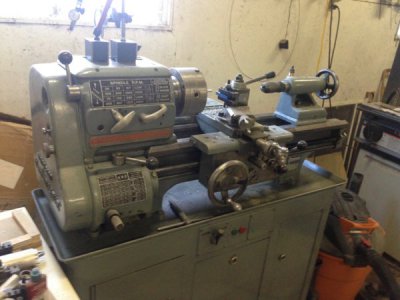
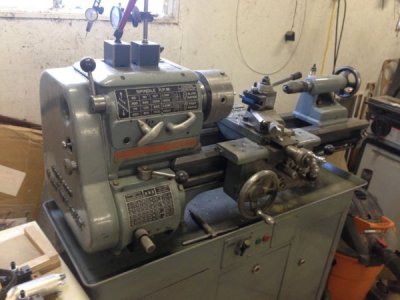
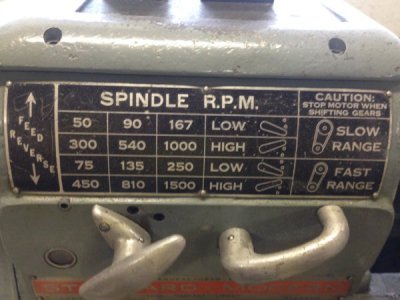
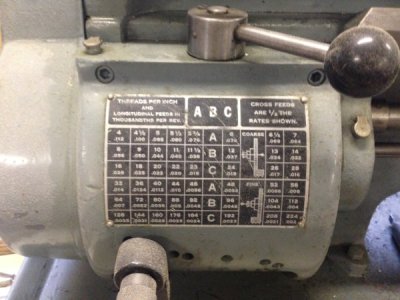
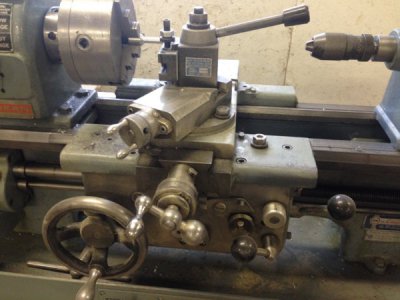
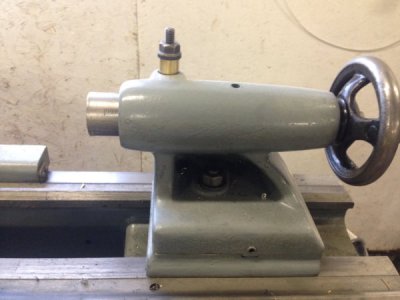
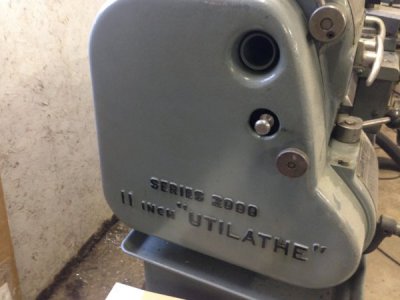
I then made a captured nut on a rod for this oldest grandson of mine and then just recently I made a couple of spinning tops for him as well.
link of Quick video of a couple tops spinning: https://drive.google.com/file/d/0B879cPTXE9LcNy1UckMtMVVpZU0/view?usp=sharing
For my sons I made 9 dead blow hammers with replaceable tips. Bought the tips on fleabay and then turned the rest of the parts in aluminum. Turned, tapered, knurled and threaded the handles with the lathe. Turned the heads, stepped shoulders to fit the heads, drilled and threaded with taps. 14mm for the tips and 1/2x13 for the handle. Put the heads into a 4 jaw chuck to machine the flats (on both sides) where I stamped my PAX logo. I think they turned out ok!! Only problem is I gave them all away!!! I now need to make one for me!!! I'm gonna add (or remove actually) a drilled and tapped hole in the but of the handle for a scribe that I will make to screw into it. At least that's the plan.
Here are a few pics of them:
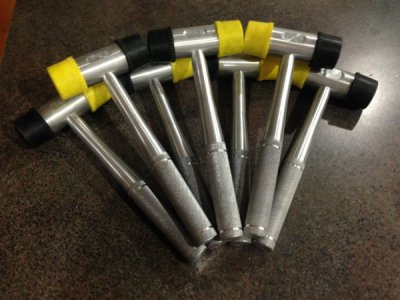
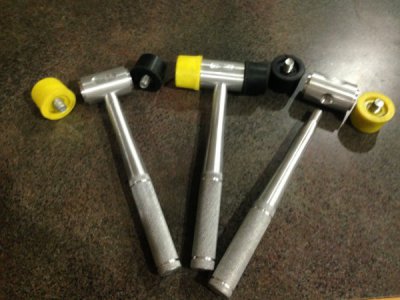
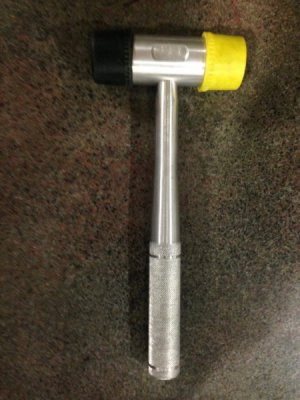
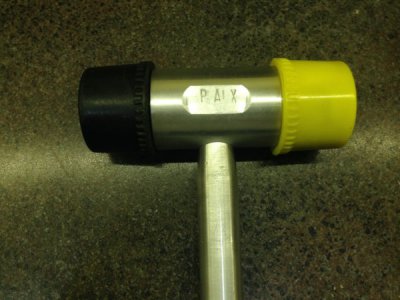
I no sooner had given my oldest son his hammer and he went to visit the inlaw's and I got a text from him with a photo of a motorcycle foot peg asking if I would be able to make one. I guess his FIL had one actually fall off in flight and couldn't end up finding it. A replacement from Honda or 3rd party was gonna be very dear. I've finally got it in hand and it should be an easy make. How fun is this, eh?
Anyway..........loving my machine. It's really tight and once I aligned everything she is as accurate as I am or care to be. I'm really enjoying this new toy and make a few chips most everyday.








I then made a captured nut on a rod for this oldest grandson of mine and then just recently I made a couple of spinning tops for him as well.
link of Quick video of a couple tops spinning: https://drive.google.com/file/d/0B879cPTXE9LcNy1UckMtMVVpZU0/view?usp=sharing
For my sons I made 9 dead blow hammers with replaceable tips. Bought the tips on fleabay and then turned the rest of the parts in aluminum. Turned, tapered, knurled and threaded the handles with the lathe. Turned the heads, stepped shoulders to fit the heads, drilled and threaded with taps. 14mm for the tips and 1/2x13 for the handle. Put the heads into a 4 jaw chuck to machine the flats (on both sides) where I stamped my PAX logo. I think they turned out ok!! Only problem is I gave them all away!!! I now need to make one for me!!! I'm gonna add (or remove actually) a drilled and tapped hole in the but of the handle for a scribe that I will make to screw into it. At least that's the plan.
Here are a few pics of them:




I no sooner had given my oldest son his hammer and he went to visit the inlaw's and I got a text from him with a photo of a motorcycle foot peg asking if I would be able to make one. I guess his FIL had one actually fall off in flight and couldn't end up finding it. A replacement from Honda or 3rd party was gonna be very dear. I've finally got it in hand and it should be an easy make. How fun is this, eh?
Anyway..........loving my machine. It's really tight and once I aligned everything she is as accurate as I am or care to be. I'm really enjoying this new toy and make a few chips most everyday.
- Joined
- Nov 14, 2014
- Messages
- 851
Good for you! I just love these old Utililathes. Wish mine wasn't so tired from singlehandedly keeping the Canadian Navy afloat for 30 years.
- Joined
- Apr 10, 2016
- Messages
- 18
Yup Glenn, they are good lathes but can still be worn out. 30 years doing Navy work would do that!! I'm lucky in the one I got. From a high school shop that didn't see very much use and no evidence of chucks dropped on the ways or crashes and all the bearings seem to be good and well maintained. I am missing 2 oiler gits, but they to have been removed and just not replaced, not broken off.
- Joined
- Nov 29, 2015
- Messages
- 439
I just loved reading this. It's hard to explain where good enough lies in the field of OK and scrap pile makings. Horribly the margins of error go out of bounds quickly when the tools used to "readjust" as it were from micrometers to "what size sledge hammer do I need?" levels At which point the fire extinguishers should quickly be located with haste.As an engineer managing other engineers, one of my greatest challenges was getting them to accept good enough. Best is the enemy of good enough, I would tell them. That doesn't mean that shoddy is good enough; it's very important to correctly identify how good something needs to be, including a margin to account for variables, and the means to rectify issues when the inevitable mistake happens that drives quality too low.
Steve Shannon, P.E.

Paul
- Joined
- Apr 10, 2016
- Messages
- 18
I've been thinking about this for a while now. While my dad was one from that old mind-set of "never force it son, just get a bigger hammer", he also never did a job half way and those things that required precision received precision and accuracy. He had a great perspective of what was "good enough", but somehow I never seemed to be able to capture that and I always seem to have to have "perfection" and can't seem to realize that value of "good enough". I recently had quite a discussion with a special education councillor that comes to our school about that very thing and she was explaining things I could do to help me overcome my OCD when doing those things that don't require that kind of level of perfection. Things like purposefully doing some non-critical projects to a "good enough" level and leaving it that way........It hasn't worked. I tried to explain to her that I have actually done that a couple of times and while nobody else would probably ever notice the flaws in my workmanship I feel the need to point out and then apologize to anyone and everyone for my mucked up project. I eventually redid those projects to my level of "good enough". My wife just shakes her head at me. In a work or job environment I might be able to maintain that kind of acceptance when I come to understand what the level of perfection required is and then I could be satisfied with a job completed. But as I do this as a hobby, my attitude is "I'll do it the way I want to have it done." The best part of this whole mindset of mine is I find that reaching for higher levels quite often requires new tools!!I just loved reading this. It's hard to explain where good enough lies in the field of OK and scrap pile makings. Horribly the margins of error go out of bounds quickly when the tools used to "readjust" as it were from micrometers to "what size sledge hammer do I need?" levels At which point the fire extinguishers should quickly be located with haste.
Paul
- Joined
- May 4, 2015
- Messages
- 3,583
Welcome noob, soon to be addicted if not all ready, lathe now , mill later , bandsaw , grinders, drills cutters . Omg am I scarring you yet , lol we all know the one who has the most tools wins. YUPP great site, we try to help but we need our picture fix , it don't happen if there's no picture.
You'll read it ALOT . Some like me now are unable to do what we love so it's a vicarious life for now.
You'll read it ALOT . Some like me now are unable to do what we love so it's a vicarious life for now.
- Joined
- Apr 30, 2015
- Messages
- 12,242
Those machines are so nice- I love that little tray on the headstock- more lathes should have that.
Mark S.
Mark S.

 Steve Shannon, P.E.
Steve Shannon, P.E.